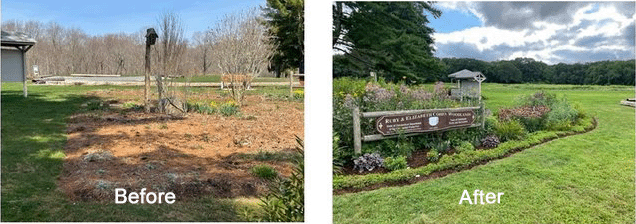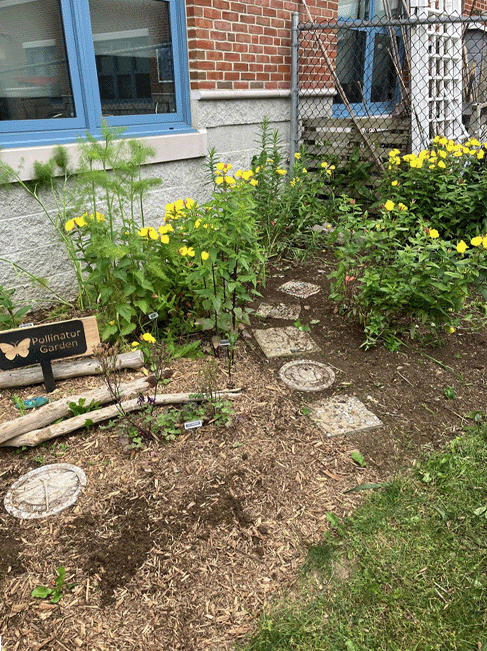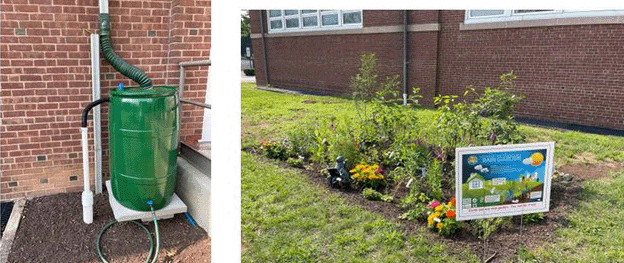2023 Grant Project Reports
As the alumni association for certified Connecticut Master Gardeners, we provide opportunities to share our knowledge and love of gardening with others. Through sponsorship of grants and leadership of volunteer projects throughout the state, CMGA members are helping to educate and beautify our communities.
In 2023, through the generosity of our members and other donations, we were able to award almost $3,150 in Grants for 13 Master Gardener and Master Gardener Intern projects.
Cohen Woodlands Butterfly-Pollinator Garden revitalization project, Colchester
Native Plants that Attract and Support Butterflies, Ballard Park's Native Plant Garden, Ridgefield
Peoples Harvest Garden, Pomfret
Windham Edible Landscape Permaculture Garden, Brooklyn
Potting Bench for Bethel Schools Student Garden, Bethel
Hamden Seed Library’s Rain Garden/Rain Barrel Project
Mark Twain House Conservatory Restoration, Hartford
New London - Great Neck School Garden/Pollinator Garden, New London
Botanical Markers at Mark Twain House, Hartford
Byram Park Pollinator Border Garden, Greenwich
Batchelder Montessori Magnet School Garden, Hartford
Peace Pole Pollinator Pathway, Canton
Wakeman Town Farm Pollinator Garden-Educational Signage Project, Westport
Cohen Woodlands Butterfly-Pollinator Garden revitalization project, Colchester
This is a continuation of an existing project at the Cohen Woodlands Butterfly Pollinator Garden in Colchester. There are 4 main sections of this public garden each containing perennials and shrubs that serve to provide food, nectar and/or shelter for birds, beneficial insects, pollinators, various lepidoptera and specifically for the decreasing population of monarch butterflies.
The garden began as a community outreach project in 2014 to create an educational butterfly-pollinator garden near the park's sign. Some 9 years later, the garden (and specifically gardens 1 and 2) required major revitalization. The plan was to dig out multiples of the same plant to create more space and to incorporate new and different native or nativar plants and shrubs in those areas, adding more diversity to the gardens and to replace some of the non-native shrubs in the gardens with native ones.
Two grants were awarded - one from the Connecticut Master Gardeners Association and one from the Horticultural Society- which was used to purchase a total of 13 new shrubs and 35 perennials. The project was completed in 5 phases.
Going forward, the garden will be used for “Learn and Do” sessions with the Colchester Garden Club members and the public on topics such as how to divide and transplant perennials, how to deadhead for rebloom, which plants can be cut back early in the growing season for reduced height (Chelsea Chop), how to prune shrubs and how to do cutbacks and cleanup during fall or spring.
Native Plants that Attract and Support Butterflies, Ballard Park's Native Plant Garden, Ridgefield
In 2022, Ridgefield Garden Club (RGC), with the support of Ridgefield Parks & Recreation, decided to establish a native plant teaching garden in Ballard Park, the popular public park on Ridgefield’s Main Street. The intention was that it be a teaching garden with a focus on introducing garden visitors to native species and explaining the many benefits of native plantings through conversations with RGC members working in the garden, plant labels & additional educational signage & a
QR code link to the RGC website (www.ridgefieldgardenclub.com).
The proposed project is to help the RGC establish the Ballard Park Native Plant Garden by:
• Helping defray the costs of certain native plants – specifically for the “butterfly section”.
• Assist in planting the garden as part of a team of volunteers that includes RGC members, several of whom are Master Gardeners.
• Properly labeling all native plantings in the garden.
Peoples Harvest Garden, Pomfret
The Peoples Harvest garden was begun in 2005 by the Windham County MG class. The garden is maintained by MG and intern volunteers with intermittent help from area schools/summer camps. This proposal was for soil enhancement and procurement of supplies to increase the productive capacity of the garden. Reducing Food insecurity, one goal of the Peoples Harvest, is to maximize vegetable production which is donated to local kitchens that serve those in need. Public Education, a second goal, provides a learning site for the public to join with master gardeners and learn about gardening. MG outreach education, a third goal, provides an outreach opportunity for interns and MGs where they can learn sustainable methods of vegetable production.
Windham Edible Landscape Permaculture Garden, Brooklyn
The intention of this project was to turn a fallow, overgrown plot of land next to the Windham Uconn extension site into an edible show garden using permaculture principles. This project has been worked on primarily by Master Gardeners, and has also had other community members such as a local civil engineer, farmer, mason, and arborist who volunteer time and materials.
The overall goals of this project was to create an edible landscape garden using permaculture principles, become a demonstration garden for the general public and demonstrate ideas of permaculture and importance of native plantings.
Potting Bench for Bethel Schools Student Garden, Bethel.
This request was to help enhance the existing Bethel School Student Garden Project to create a dedicated workspace for demonstrations and daily garden work used for lessons, potting of plants and other projects. Previously these tasks were performed by balancing boxes on top of the wheelbarrow or on the ground. A sturdy, permanent steel potting bench next to the hose water source now provides a comfortable workspace and surface for garden projects and lessons.
Hamden Seed Library’s Rain Garden/Rain Barrel Project….
Brundage Library is located in a diverse, working-class neighborhood in Hamden where programs are conducted about native plant seeds and use of these plants to help butterflies and moths. Brundage Library has very little landscaping, aside from lawn, therefore to reinforce previous programming, and to enliven the curb appeal of the library building, the project proposed to the library was to install a “demonstration” rain garden with a rain barrel at the site to share with the neighborhood. People have been quite receptive to the programs so far, demonstrating how relatively easy it is to conserve and use free rainwater on their own property.
Mark Twain House Conservatory Restoration, Hartford
In collaboration with the Mark Twain House and Museum located in Hartford, a team of Master Gardeners planned to obtain new plants and supplies for the Conservatory in the Twain House with species appropriate to the 1870s, during the period when Samuel Clemens, better known as Mark Twain, lived in the house. Since opening to the public in the 1970s, the conservatory in the Twain house has been an important feature of this restored National Landmark structure, educating visitors about the history of horticulture in private homes in the US.
New London - Great Neck School Garden/Pollinator Garden, New London
The Great Neck School Garden started in 2013 and has been "growing hearts and minds" ever since. Marcia Benvenuti is the coordinator and director of the project. She saw the need for additional nutritional learning and offered hands-on experiences with gardening. This proposal wanted to use funds to complete the pollinator garden that was roughly started last year.
Botanical Markers at Mark Twain House, Hartford
This new project for the Mark Twain House. Having worked for several years to restore the gardens using plant materials that are historically correct for the time period that the Clemens family lived at the house, and installing new garden signs for each of the 10 main gardens, additional botanical markers are sought to help improve helpfulness and education.
Byram Park Pollinator Border Garden, Greenwich
This project was a restoration of an existing seaside pollinator garden installed around 2018. It had fallen into disrepair, as it was not maintained; many of the plants died or are not thriving and invasives had taken over.
There were four phases for 2023: Inventory & Mapping, Weeding, Cardboard & Sheet Mulching and Adding Native Plants with the following objectives:
• Form a volunteer task force
• Create an annual maintenance plan with local volunteers
• Weed throughout the season
• Install additional native and coastal plants
• Town of Greenwich to weed central section
• Lead educational tours
Batchelder Montessori Magnet School Garden, Hartford
The project being applied for in the grant application is a continuation of an existing project, which provides gardening activities for students in grades PK-6 at the Batchelder Montessori Magnet School on New Britain Avenue in Hartford.
Peace Pole Pollinator Pathway, Canton
This is a continuation of an existing project. A team of master gardeners started the Peace Pole Pollinator Pathway (PPPP) native flower garden in 2021 as the second public native flower garden on the Canton Pollinator Pathway. The goal of this project is twofold: public education about natives and providing food and habitat for wildlife. A secondary goal is to remove the invasives along the perimeter of the turf grass where the Peace Pole garden is located to make room for the native plants already growing there.
Wakeman Town Farm (WTF) Pollinator Garden-Educational Signage Project, Westport
The Educational Signage Project is new, initiated by WTF's Teen Advisory Board. The Pollinator Garden was conceived at WTF in 2017 to model a pollinator friendly habitat and sustainable gardening practices.
The goal is to provide permanent, readily visible, informative signage with an on-line educational component. The greater goal is an increased public understanding of pollinator habitats, their importance and what is needed for their creation and sustainability.








